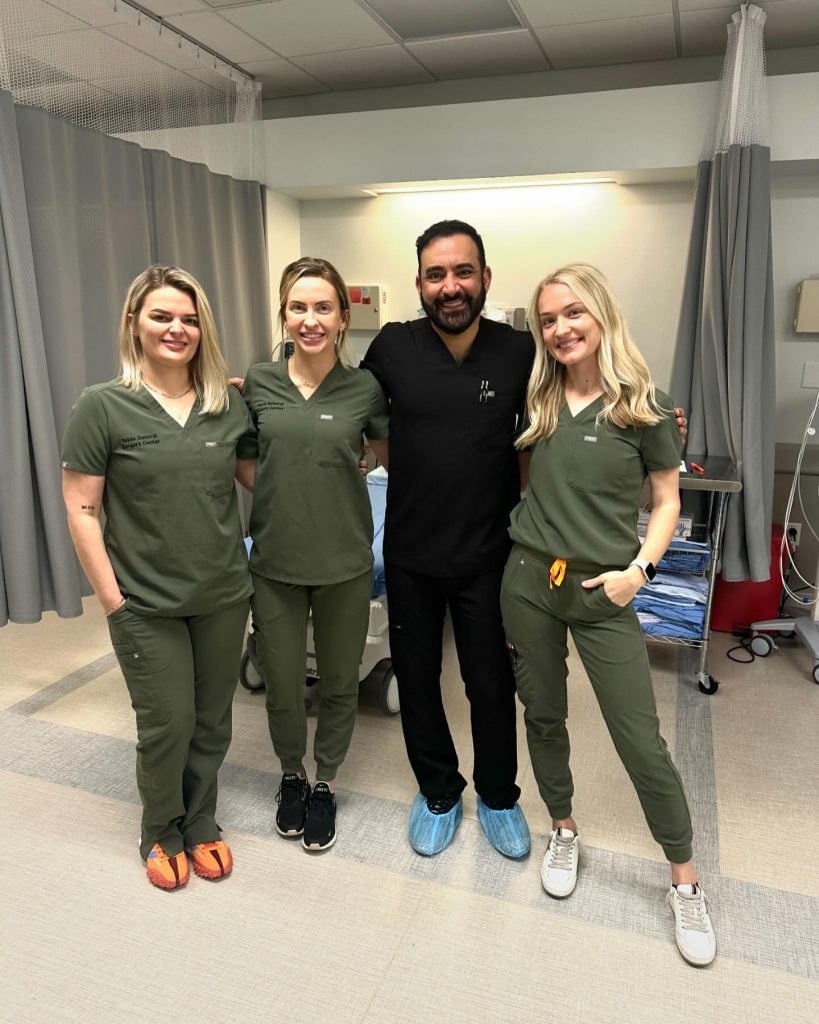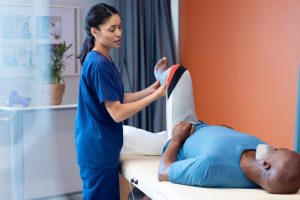Herniated disc lower back pain is one of the most common reasons people seek help from pain specialists. Whether it’s a disc bulge, slipped disc, or degenerative disc disease, the discomfort can interfere with daily life. This article explains what causes lower back pain from a herniated disc, how it’s diagnosed, and what treatment options really work—especially if you’re in Fort Worth, Allen, Coppell, or Garland, TX.
What Is a Herniated Disc?
Your spine is made of small bones (vertebrae) separated by soft cushions called discs. These discs act like shock absorbers. A herniated disc happens when the soft center of the disc pushes out through a crack in the tough outer layer. It can press on nearby nerves, causing pain, tingling, or weakness in your lower back or legs.
Common Causes of Herniated Discs
- Repetitive movements or heavy lifting
- Age-related wear and tear (degenerative disc disease)
- Sudden injury or trauma
- Poor posture and weak core muscles
- Smoking, which reduces disc health
Dr. Ghalambor, interventional pain expert at NorTex Spine & Joint Institute, explains:
“We often see patients with lower back pain caused by both wear-and-tear and lifestyle habits. A herniated disc is more common than people think—and early treatment can make a big difference.”
Signs and Symptoms
Some herniated discs don’t cause any symptoms, but when they do, you may notice:
- Sharp or burning lower back pain
- Pain that travels to the hips, buttocks, or legs
- Numbness or tingling in the legs
- Muscle weakness
- Pain when bending, sitting, or lifting
These signs are especially common with a slipped disc in the lower back, where nerve pressure is involved.
Herniated Disc vs. Disc Bulge
A disc bulge is a more mild form of disc movement. The disc stays intact but shifts out of its normal space. A herniated disc involves a break in the outer disc layer with material leaking out. Both can cause lower back pain, but herniation tends to be more painful and urgent to treat.
Diagnosis: How It’s Confirmed
A doctor will start with a physical exam and may order:
- MRI scans to view the spine in detail
- X-rays to rule out bone problems
- CT scans if more imaging is needed
- Nerve tests if symptoms affect muscle strength
If you’re in the area, scheduling a lower back MRI at a local pain relief clinic can help guide treatment quickly.
Non-Surgical Treatment Options
In many cases, surgery is not the first choice. Most people respond well to:
- Physical therapy for herniated disc lower back pain, focusing on core strength and flexibility
- Anti-inflammatory medications to reduce swelling and discomfort
- Epidural steroid injections to calm irritated nerves
- Heat or ice therapy for daily relief
- Lifestyle changes such as posture correction and quitting smoking
- Chiropractic adjustments, especially with a specialist trained in disc issues
Dr. Ghalambor shares:
“For many of our patients, a combination of physical therapy and image-guided injections provides real relief. Every treatment plan should be tailored to the patient’s unique spine structure and symptoms.”
If pain continues, we may also explore minimally invasive options before surgery.
When Surgery Is Needed
Surgery may be considered when:
- There’s no improvement after months of conservative care
- There is severe nerve compression
- You have loss of bladder or bowel control (a medical emergency)
- Pain limits your ability to walk or perform basic tasks
In these cases, a spine specialist appointment near you is important. Surgery options may include microdiscectomy or spinal fusion.
Living with Degenerative Disc Disease
If your lower back pain is linked to degenerative disc disease, you’re not alone. This condition progresses with age, but symptoms can be managed. Focus on:
- Gentle daily movement
- Core exercises
- Stretching routines
- Degenerative disc disease therapy options such as massage, acupuncture, or radiofrequency ablation
A pain relief clinic for herniated disc pain can offer tailored support to reduce flare-ups and maintain activity.
When to Get Help
Don’t wait if your lower back pain:
- Lasts more than a few weeks
- Gets worse instead of better
- Causes numbness, tingling, or weakness
- Limits your daily life or sleep
Search for herniated disc treatment near me, or book a lower back pain consultation with an expert.
Dr. Ghalambor advises:
“Prompt care can prevent further damage. Whether it’s a disc bulge or a slipped disc, the right diagnosis leads to faster healing and long-term pain control.”
While NorTex Spine & Joint provides specialized care, many reputable clinics offer similar treatments. Always seek multiple opinions before deciding on treatment.
If you’re located in Fort Worth, Allen, Coppell, or Garland, TX, and need expert advice, NorTex Spine & Joint Institute is ready to help. Schedule your consultation with a slipped disc specialist near you and take the next step toward relief.
Additional Resources:
https://www.mayoclinichealthsystem.org/hometown-health/speaking-of-health/7-common-low-back-pain-faq
https://www.webmd.com/back-pain/what-helps-with-lower-back-pain







